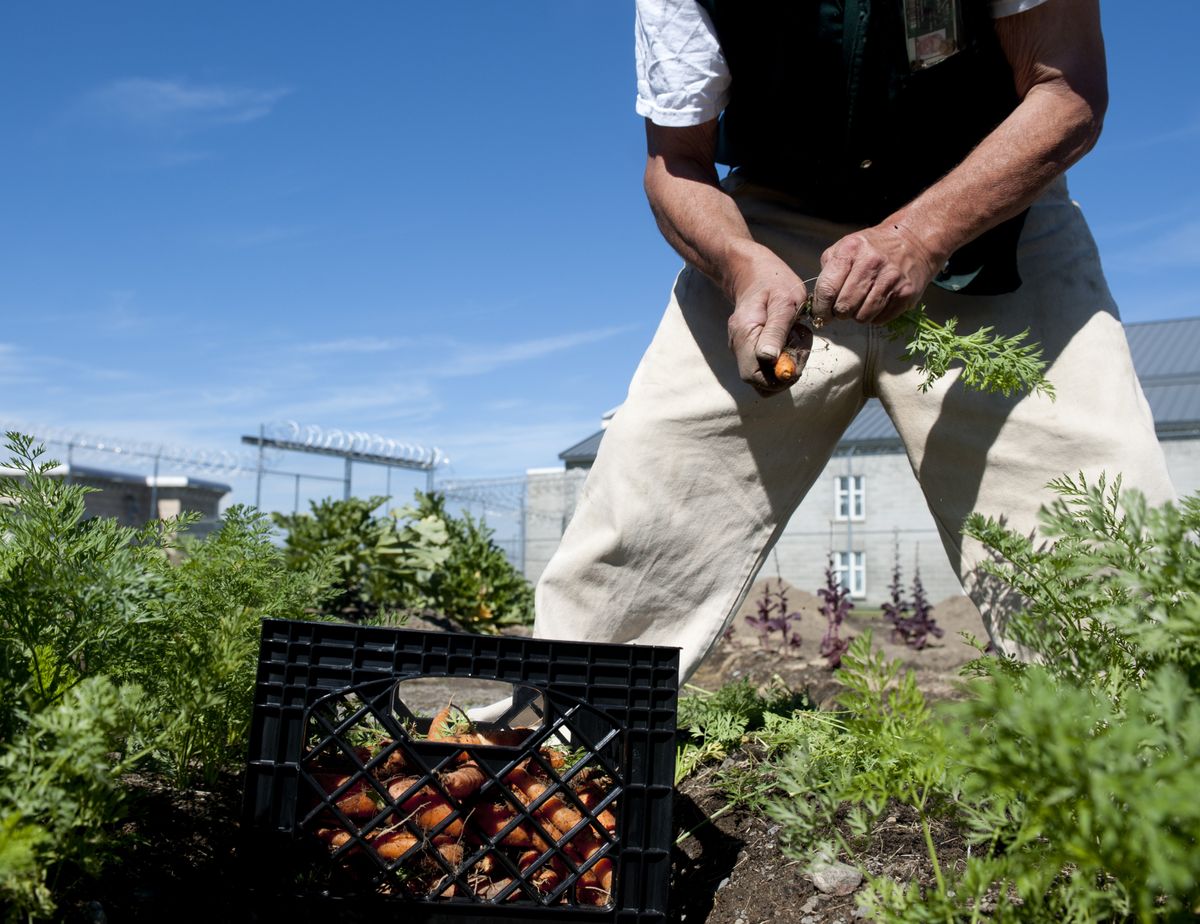Prison gardens provide food for inmates’ tables, spirits

It’s been almost 10 years since Dan Stockwell sat in Kitsap County Jail, waiting to be sentenced to life without parole on charges of child molestation.
Now, he’s a gardener at Airway Heights Corrections Center, harvesting vegetables and drawing up landscape plans for a garden just a few yards from his cell.
Earlier this year, the prison created community vegetable gardens to be maintained by offenders. It’s the peak of harvest at the prison, and inmates are plucking fall vegetables from the ground to be cooked in the prison’s kitchens.
“It allows me to work off the kinds of frustrations you get from having to sit in a cell,” Stockwell said, taking a break from harvesting.
Airway Heights has had success with its gardening program since 2010, when the prison installed a kitchen garden maintained by five paid inmates, Capt. Ron Haynes said.
This year, prison officials expanded the program to include three smaller gardens near cellblocks, maintained entirely by offenders in those blocks. Like the kitchen garden, the produce is used to feed inmates. The inmates who tend the community gardens aren’t paid, but prison officials said the work provides emotional benefits to the inmates and financial benefits to the jail operation.
Stockwell began working in the gardens in late April, turning the dirt, adding nutrients and planting the seeds. Last week, plump squash, cilantro and zucchini were ripe for harvest in the garden.
The gardens help him feel better despite being behind bars, Stockwell said.
“It’s the sense of accomplishment,” Stockwell said. “Obviously, anything that comes out of here is not being bought for us. It goes on our plates and that’s cool.”
Food services manager Mark Murphy estimates the gardens will produce about 25,000 pounds of fresh vegetables this season. About 2,500 of that will come from the community gardens. Prison administrators plan to expand the program to more cellblocks next year to increase production and allow more inmates the opportunity to participate.
Currently, Airway Heights gardens are planted with 21 different crops, including squash, bell peppers, cucumbers, potatoes, broccoli and spinach.
Officials plan to increase the variety of produce in coming years, including cantaloupe and other melons, as well as a small apple orchard.
The produce is used by inmates in the kitchens and fed to about 2,100 inmates and staff members. The vegetables are usually added to other meals to improve the quality and flavor, said Marc Miller, a prison employee in food services. The smell of fresh vegetables is strong in the prison kitchen, as cooks clean and chop cucumbers and carrots harvested that morning.
In the long run, Miller hopes the program will save Airway Heights – and by extension, taxpayers – money.
“It’s not coming to the back door with an invoice attached to it,” Miller said of the produce used in the kitchen.
Officials also predict they’ll see an improvement in inmate attitude as the program grows. Lt. Leonard Mayfield said since he’s been involved in the project, he’s observed less violence among inmates. Analysts have not determined the exact impact of the gardens yet, but he’s sure this summer will show fewer fights than last year.
“Our main objective is to keep everybody safe in here,” Mayfield said. “And the less my staff have to respond to fights and violence, the better off it is for all of us.”
Michael Zeno, who is finishing a sentence for robbery, has worked in the garden outside his cell since he was transferred to Airway Heights three months ago.
Zeno has an extensive criminal record of robbery, theft and assault, but he hopes for a better future. He has a wife and three young children at his home in Western Washington, and he said he thinks gardening will help him become a better person once he leaves prison.
“This is something I can take home with me to my wife and my kids and show them what I learned in prison,” he said. “Most people say we learn to become better criminals in prison. That’s not always true.”
His 6-year-old daughter has already asked if he’ll help her start her own garden when he returns home.
And perhaps more of a motivator, Zeno plans on staying out of trouble with his wife.
“As long as I’m not on the streets causing trouble, in the backyard doing this, she’ll be happy,” he said.